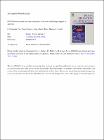| dc.contributor.author | LYNCH, MARINA | en |
| dc.contributor.author | COX, FRANCES FIONNUALA | en |
| dc.date.accessioned | 2012-06-27T14:01:56Z | |
| dc.date.available | 2012-06-27T14:01:56Z | |
| dc.date.issued | 2012 | en |
| dc.date.submitted | 2012 | en |
| dc.identifier.citation | F. Fionnuala Cox, Donal Carney, Anne-Marie Miller, Marina A. Lynch, CD200 fusion protein decreases microglial activation in the hippocampus of aged rats, Brain, Behavior, and Immunity, 26, 5, 2012, 789-796 | en |
| dc.identifier.other | Y | en |
| dc.identifier.uri | http://hdl.handle.net/2262/64045 | |
| dc.description | PUBLISHED | en |
| dc.description.abstract | The glycoprotein, CD200, is primarily expressed on neurons and its cognate receptor CD200R is expressed principally on cells of the myeloid lineage, including microglia. The interaction of CD200 with its receptor plays a significant role in maintaining microglia in a quiescent state and therefore a decrease in CD200 expression in brain is associated with evidence of microglial activation. Conversely, activation of CD200R, for example using a CD200 fusion protein (CD200Fc), should result in a decrease in microglial activation. Here we assessed the effect of delivery of CD200Fc intrahippocampally on microglial activation and on long-term potentiation (LTP) in perforant path-granule cell synapses in young and aged rats. We hypothesized that the age-related changes in microglial activation would be attenuated by CD200Fc resulting in an improved ability of aged rats to sustain LTP. The data indicate that expression of markers of microglial activation including major histocompatibility complex Class II (MHCII) and CD40 mRNA, as well as MHCII immunoreactivity, were increased in hippocampus of aged, compared with young, rats and that these changes were associated with a deficit in LTP; these changes were attenuated in hippocampal tissue prepared from aged rats which received CD200Fc. Microglial activation and a deficit in LTP have also been reported in lipopolysaccharide (LPS)-treated rats and, here, we report that these changes were also attenuated in CD200Fc-treated animals. Thus the negative impact of microglial activation on the ability of aged and LPS-treated rats to sustain LTP is ameliorated when CD200R is activated by CD200Fc. | en |
| dc.description.sponsorship | This work was funded by Science Foundation Ireland. DC & FFC were recipients of Trinity College postgraduate studentships. | en |
| dc.format.extent | 789-796 | en |
| dc.language.iso | en | en |
| dc.relation.ispartofseries | Brain, Behavior, and Immunity | en |
| dc.relation.ispartofseries | 26 | en |
| dc.relation.ispartofseries | 5 | en |
| dc.rights | Y | en |
| dc.subject | Neuroscience | en |
| dc.subject | Age | en |
| dc.subject | CD200 | en |
| dc.subject | Long-term potentiation (LTP) | en |
| dc.subject | LTP | en |
| dc.subject | microglial activation | en |
| dc.subject | hippocampus | en |
| dc.subject | lipopolysaccharide | en |
| dc.subject | LPS | en |
| dc.title | CD200 fusion protein decreases microglial activation in the hippocampus of aged rats | en |
| dc.type | Journal Article | en |
| dc.type.supercollection | scholarly_publications | en |
| dc.type.supercollection | refereed_publications | en |
| dc.identifier.peoplefinderurl | http://people.tcd.ie/lynchma | en |
| dc.identifier.rssinternalid | 75526 | en |
| dc.identifier.doi | http://dx.doi.org/10.1016/j.bbi.2011.10.004 | en |
| dc.subject.TCDTheme | Neuroscience | en |
| dc.contributor.sponsor | Science Foundation Ireland (SFI) | en |




